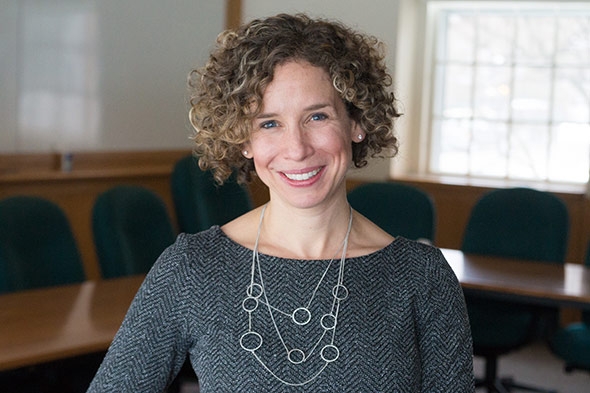While the environmental effects of natural gas fracking on a community are the subject of debate, a senior thesis by recent Dartmouth graduate Ayushi Narayan ’14 finds a strong correlation between increased fracking production and local high school dropout rates.

Narayan began her research as a term paper for Associate Professor of Economics Elizabeth Cascio’s seminar “Topics in Public Economics.” With Cascio working as her adviser, she expanded it into a prize-winning senior thesis, which the professor and her former student are now working on in hopes of publishing it in an academic journal.
Narayan won the Rintels Prize for Social Sciences for her senior thesis, “The Impact of Natural Gas Fracking on High School Dropout Rates.” The economics department nominated Narayan for the prize, established in 1986 by the family of Jonathan B. Rintels Sr. ’27. The Rintels Prize is awarded each year to two undergraduates, in either the arts and humanities or the social sciences, for an outstanding senior thesis.
After graduation, Narayan took a job with Deloitte Consulting in Washington, D.C., but Cascio nevertheless urged her to expand on the “original, thorough, and significant” scholarship of the fracking thesis for publication.
Narayan’s research “provides some of the most credible insight to date into how local natural resource booms affect individual schooling choices,” says Cascio, whose work focuses on the economics of education as well as labor and public economics.
“The implications are startling: A positive ‘shock’ to a local economy—here, the introduction of a new technology to extract natural gas and oil—can leave a potentially permanent negative mark on the skills of its workforce,” Cascio says.

Narayan, who double majored in environmental studies and economics with a minor in public policy, says Cascio’s one-on-one work with students and her enthusiasm for finding new methods to explore topics in economics inspired Narayan to keep going with her research.
“She has contributed a great deal of expertise and time to the project, especially now as we are moving forward to publish. The paper has become more impressive than I ever expected,” Narayan says. “She’s been both a great teacher and a great mentor.”
The Implications
The thumbnail version of Narayan’s thesis is that fracking has raised the “opportunity cost” of finishing high school, meaning that the immediate earnings potential in the extraction industries makes it less financially attractive to stay in school.
Using state and federal data on dropout rates coupled with natural gas production statistics, Narayan found dropout rates among men in target areas rose as fracking extraction increased. Her paper started as an examination of fracking and dropout rates in Pennsylvania. Now, with Cascio’s help, she has broadened her research to cover all states in the country with fracking potential.
Although there have been studies looking at the secondary economic effects of natural resource extraction booms, says Cascio, Narayan’s focus on data related to the relatively recent phenomenon of fracking, along with her use of extensive and consistent public information on high school dropout rates, is an original contribution to the literature on the topic.
“The result is a fine piece of empirical research at the intersection of environmental and labor economics, with possible implications for public policy,” Cascio says.
At the Frontier
Working with students in her public economics seminar keeps Cascio current on a broad range of recent research beyond her own concentration, she says.
“The class keeps me up to speed in other areas in the field. Health care, for example,” she says. “I want my students to learn something pretty close to the frontier.”
And in turn, she says, “They keep me on my toes.”
And when students like Narayan produce quality scholarship, Cascio says, she is committed to helping them continue with their work, and perhaps pursue an advanced degree.
“It is a very rewarding experience to teach a student like Ayushi,” she says.
